Can you handle data sustainably?
By default, data is one of the most essential assets of a company.
Every department in your company depends on quality data to operate effectively, be it in IT, accounting, or production.
Although you may have business intelligent software, data doesn’t automatically format itself. That’s why you need a clear data governance strategy to ensure the data your business is generating is usable, trustworthy, and secure.
Big data multiplies in large volumes and types as your business grows and users automatically need to answer more complex questions to run the business effectively.
In fact, according to IBM data is among the top challenges for the 1700 companies it surveyed.
This essentially means that you need to set up systematic processes and standards for acquiring and handling data.
In this article, we’ll go in-depth on 5 reasons why you should have a clear data governance strategy.
Let’s get started.
1. To Enhance Data Consistency
One of the main causes of conflict in a company is achieving different results for similar subjects within departments.
For example, let’s say that a COO is analyzing sales and marketing data given to him by the marketing department but achieving different results. This challenge could arise because they are using different sets of data to arrive at a similar conclusion, which is not possible.
In addition to that, inaccessible data in a department due to data silos can lead to organizational inefficiencies.
This is especially true for multinational companies that have different units in several countries where localization leads to data flow barriers.
Consequently, these companies lack cohesion and can miss out on investment opportunities. According to ITIF, these barriers have imposed significant costs such as a reduction by 0.1-0.36% of the US GDP.
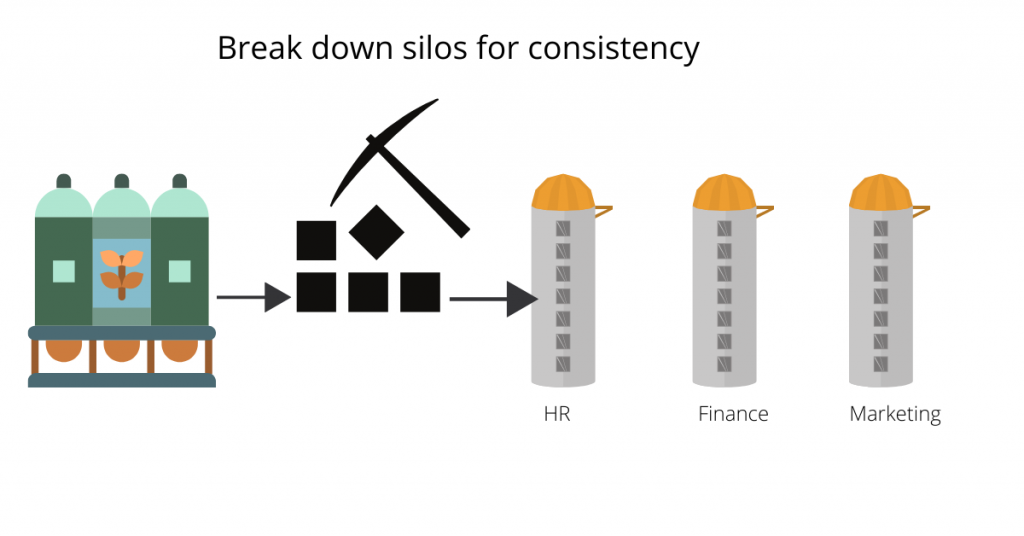
A clear data governance strategy eliminates such inconsistencies by ensuring that there are policies in place which allow for information sharing across borders, for example through cloud-based data storage applications. This way, data silos are broken and multinational companies, such as supply chains can run effectively.
In addition to that, an intelligent document processing software can transform physical documents into digital formats which can be accessed globally by cross-border departments.
Data governance also enhances consistency by recording clear standards for metrics, so that reports from different departments can have better clarity. This can be the case when using different words for similar meanings.
A US-based multinational company accumulated over 500 million patient records, but their legacy systems were slow and limited their ability to support the company’s needs.
They partnered with Itransition to create a business intelligent platform which enabled them to migrate to the cloud and improve their data management capabilities
2. For Security and Compliance
All countries have policies in place about compliance and security of user data, for example the recent GDPR data privacy guidelines.
Being non-compliant with data laws and regulations, especially in the case of private individuals, has its consequences.
One of the case points is the European General Data Protection Regulation (GDPR) that sets non-compliance fines at up to $22 million or 4% of the offender’s global turnover.
It clearly points out the data you can and can’t collect from clients. Otherwise, you would need their consent.
However, with poor data management strategies, it goes without saying that you can miss particular details that make you non-compliant. Actually, according to a prediction by Gartner, more than 50% of companies won’t be in full compliance with GDPR requirements.
This, therefore, makes security and compliance to laws and regulations one of the reasons why you should have a clear data governance strategy.
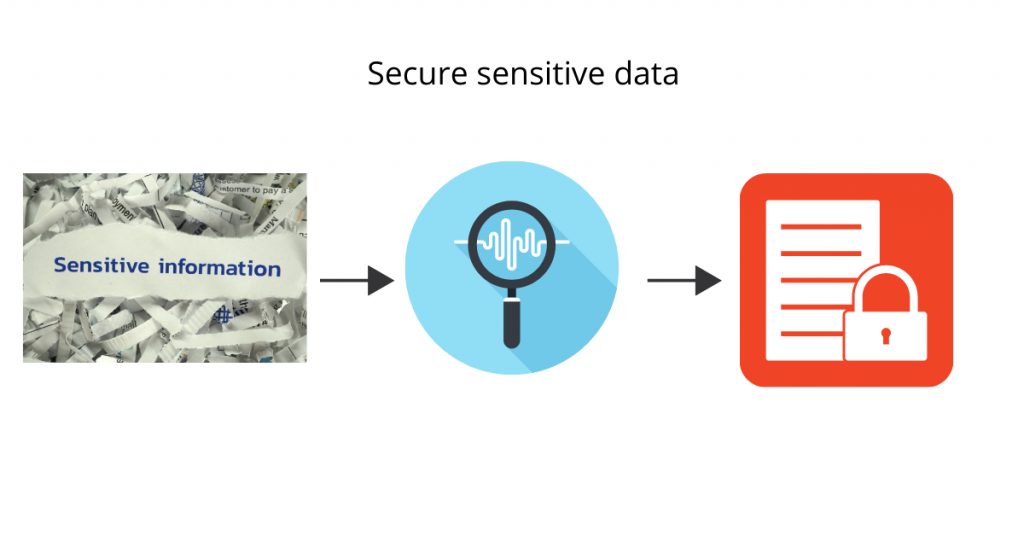
It defines how you will acquire data, store, back-up, and secure it from misuse and theft.
An effective data governance strategy also ensures you get substantiated consent from clients through verification methods such as electronic signatures made possible by AI computer vision.
It also ensures that customers are aware of the data you’re collecting and how you intend to use it. This provides parameters for audits and controls to ensure that you’re compliant with data privacy regulations.
An analyst at a Fortune 500 holding company was tasked with reviewing and reporting Sarbanes-Oxley compliance. The manual solution they were using to prepare audits increased security threats as the company grew.
Upon partnering with Varonis, the data classification engine allowed the analyst to label regulated and sensitive data by GDPR and SOX.
3. To Promote Operational Productivity
The volume of data is increasing due to an explosion of new data sources, such as online mobile platforms like social media and websites.
However, this has led to an overload of unstructured data which makes it challenging for organizations to operate efficiently.
In fact, a survey by IJARCCE reveals that 95% of the universe is unstructured data and 80% of all stored organizational data is unstructured.
When employees have to retrieve data manually and follow up on numerous data maps across global networks, it takes extra effort that would otherwise be used to improve core endeavors in your organization.
Employees, therefore, lack the motivation to work and ultimately productivity is affected.
An effective data governance strategy is a game changer; it enables you to get a handle on all your data.
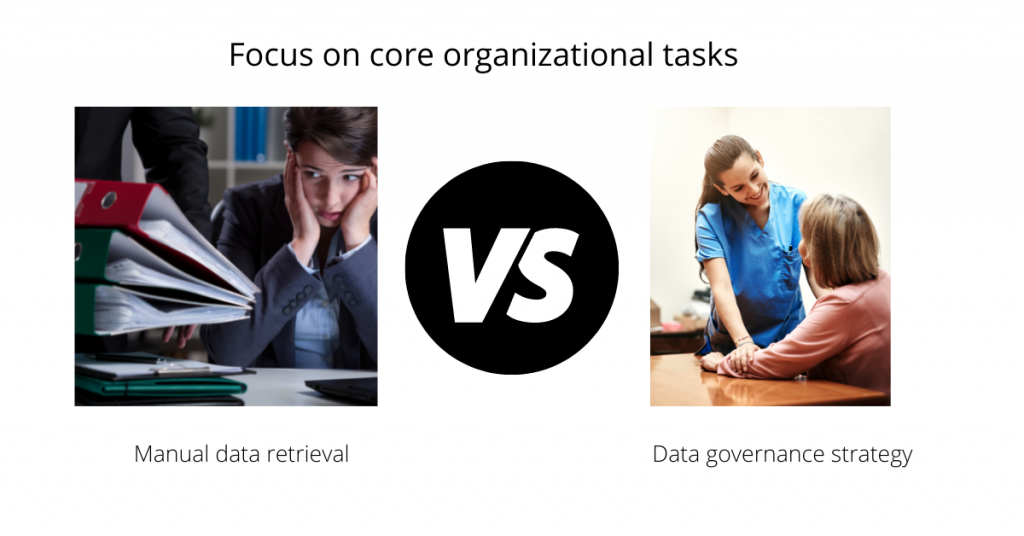
With digital transformation technologies such as content intelligence and machine learning, you can easily automate data handling to make it available to employees within the convenience of a search bar.
Intelligent document processing tools transform a lot of paperwork that is time-intensive into structured data that is faster to consume, freeing more time for employees to focus on more customer-centric tasks.
The Internet of Things (IoT) is among the technologies that contributes to the need for a clear data governance strategy.
By providing the latest information on equipment and machinery, you can make your operations more efficient by reducing machine downtime with predictive maintenance.
CTSI-Global was running house data on-premise and identified the need to incorporate a modern BI to perform advance forecasting and monitoring. With Sisense Cloud, management time was reduced by 5 to 10 hours a week and performance increased across the board.
4. To Prevent Data Hoarding
Although having a lot of data at your disposal is essential to making informed decisions, hoarding data has similar risks to those of physical hoarding.
When your database is filled with unnecessary junk files, it becomes challenging to locate essential data, which you could use more effectively.
Unfortunately, this is a common problem for many companies, where 33% of data is stale, according to a survey by Veritas Data Genomics.
As a result, you end up using irrelevant data to make complex decisions, leading to vulnerability to data breaches.
To prevent such occurrences, you need to ensure you’re only storing essential data that makes it usable within the organization.
A good data governance strategy makes this possible.
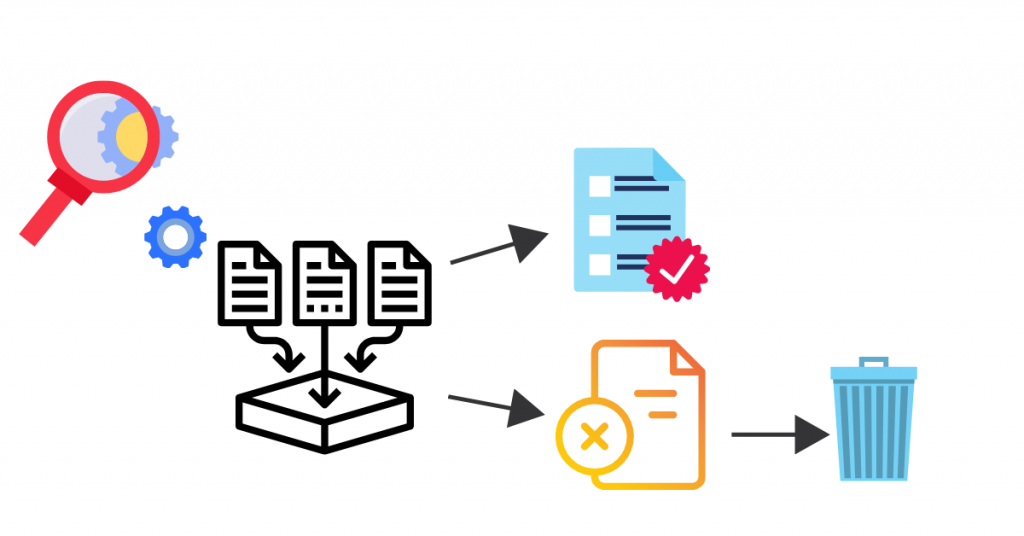
When you manage your data with AI-powered analytics tools, it becomes easier to keep track of information. This could include dates of particular documents and events, email lists, and resources within the organization.
You can easily determine which data needs to be stored and that which you should destroy.
Data governance procedures can also ensure that you don’t duplicate data that would otherwise lead to misinterpretation of information.
In addition to that, AI rule-based workflows can automate policies for systematic data retirement, say according to criteria such as age to make work easier.
Kaseya was expanding rapidly and purchasing different companies but as their database grew, it became overwhelming to manage the excess duplicates. Using RingLead, Kaseya were able to perform mass deduplication and retain key relevant data.
5. To Improve Data Accuracy
Lack of data clarity in a company can lead to serious errors that affect its efficiency.
This essentially happens when employees make mistakes and get away with them by pinning the blame on technology.
In many organizations, it is believed that the IT department owns the data, meaning when there’s an error, employees can shift the blame and evade accountability.
As a result, organizations pay huge costs on bad data that would have otherwise been avoided with a clear data strategy.
Research from IBM shows that American businesses are paying a steep price of $9.7 million annually due to bad data.
An ideal data governance strategy starts from the data source to prevent a series of reactions ignited by bad data.
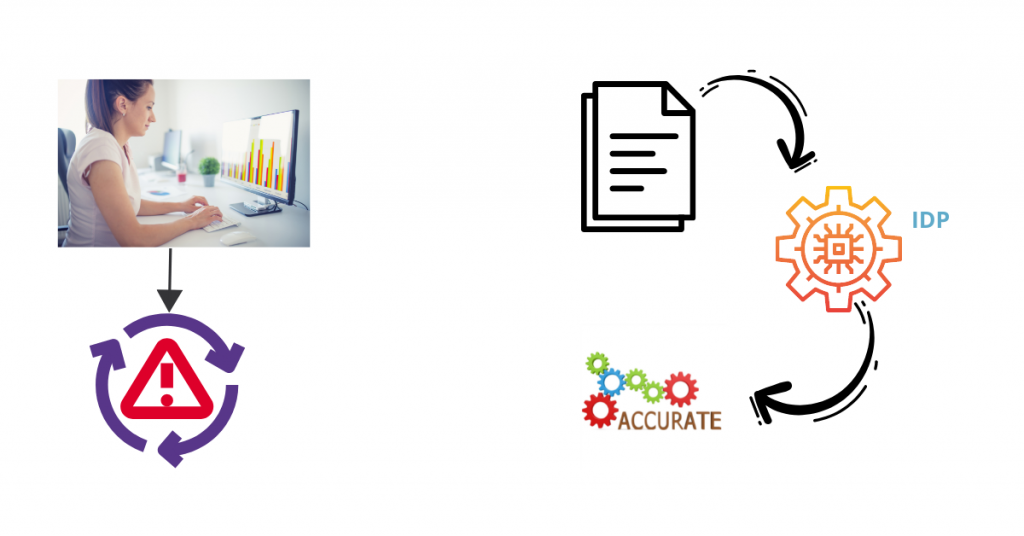
One way to make this possible is by leveraging AI-powered tools, like an OCR software that gives you insight on real-time data.
IBM research shows you can reduce workflow development time by 50-70% while still ensuring data accuracy.
Unlike traditional manual data entry methods that are error-prone, digital data collection methods using platforms like intelligent document processing offer more accuracy and speed.
This way, instead of spending time correcting errors and managing inconsistencies, you can make actionable business decisions effectively.
Centura Health was using several datasets for patient information and needed to create a single view, but their manual process was inaccurate and slow.
With WinPure, they were able to speed up the process of merging duplicate data fast and accurately.
Conclusion
Data must be managed effectively for it to be useful.
If you’re spending most of your time determining if data is usable or trustworthy, you waste time that you could have used to derive meaningful business insights from the data.
According to Experian, 83% of businesses view data as an essential part of forming a business strategy. If this goes for you as well, you can understand the reasons why you should have a clear data governance strategy.
This includes enhancing data accuracy, security and compliance, and motivating operational productivity.
Develop a data governance strategy today and use AI-powered tools for data collection and management to ensure integrity.

![5 Innovative Applications of Artificial Intelligence in Manufacturing [2021]](https://geokongo.com/wp-content/uploads/2021/09/Applications-of-Artificial-Intelligence-in-Manufacturing-2021-1024x536.jpg)


